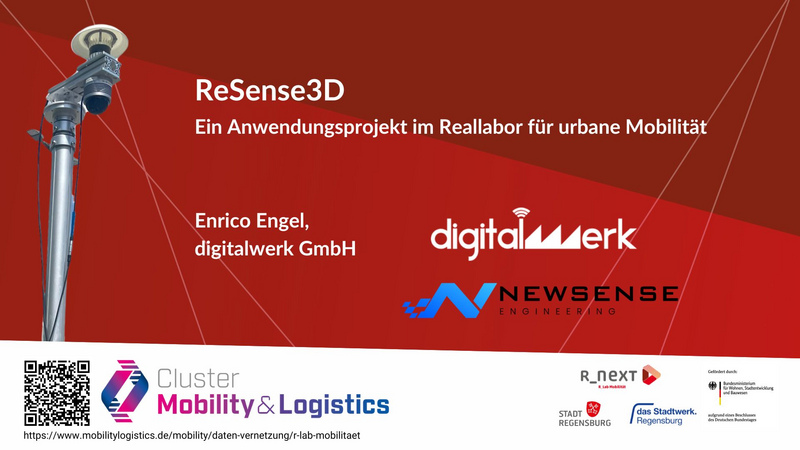As part of the R_Lab Mobility real-world laboratory at Galgenberg in Regensburg, the ReSense3D project tested an innovative approach to collecting and analyzing traffic data. Using data protection-compliant LiDAR sensor technology and AI-based software, a precise 3D model of the central bus station (ZOH) at the University of Regensburg was created. This model serves as a basis for optimizing bus operations, improving traffic safety, and promoting data-driven urban development.
In November 2024, three mobile LiDAR sensors were deployed at the ZOH for one week from Monday to Friday (November 4 to 8, 2024) to collect real-time movement data from people and vehicles without storing any personal information. The data collected enables the analysis of people flows, traffic flows, and potential hazardous situations at traffic junctions. The combination of static 3D environmental data and dynamic real-time information resulted in a digital twin that serves as a basis for decision-making for the city administration, university management, and Stadtwerk.Regensburg.
The project partners digitalwerk GmbH and NewSense Engineering GmbH contributed their expertise in the areas of LIDAR sensor technology, data infrastructure, cloud computing, and AI-based data analysis. The Cluster Mobility & Logistics took on project coordination, stakeholder management, and communication.
ReSense3D supports the goals of the Regensburg Plan 2040 by optimizing mobility and promoting data-driven urban development. The city of Regensburg, universities, and companies will also benefit from the data obtained for future projects and innovations. The Data2Science exchange format is intended to intensify data-driven collaboration with universities and Stadtwerk in the future. At the same time, on-site testing is intended to increase acceptance for such a sensor project in public spaces.
With ReSense3D, Regensburg is demonstrating how modern technology and data-driven analysis can be used to create a sustainable and safe mobility infrastructure. The use of the mobile sensor system is also being tested for other traffic-critical locations in Regensburg.



